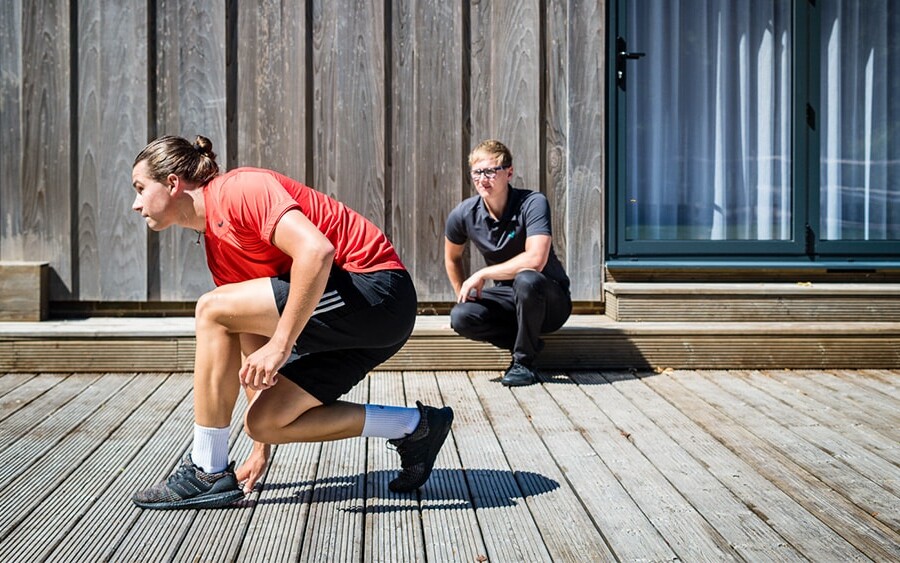Fitness and Performance
How to return to sport after injury

The road to recovery after a sports injury can feel long, daunting, and even frustrating. In fact, let’s not beat around the bush. Injury is every athlete’s worst nightmare! But it doesn’t have to be. A supportive physiotherapist, strong rehab strategy and positive mindset can ensure a much smoother, and even stronger, return to sport after injury. How? Senior MSK Physiotherapist, Benjamin Dale explains…
“At first, the idea of returning to sport after injury can feel daunting. But a strong collaboration between you, your support network and your physiotherapist is key. Because an injury doesn’t just affect your body, it affects your mindset too.” Says Benjamin.
Improve your understanding of your injury
Healing from an injury is much easier if you understand what it is and exactly how your rehab strategy is getting you back to sport again. Speak to your physio about your injury and always ask questions! Be sure to discuss returning to sport after your injury, and together you can outline appropriate timeframes. Not only is understanding your injury pivotal to maintaining motivation, it’s key to providing you with confidence to return to sport without fear of repeating the injury. In most cases, the more you understand and listen your body, the easier it will be to avoid injury next time.
See rehab as part of your sport training
Your physiotherapy rehab plan is designed to heal your injury and get you back into peak condition. So you can return to sport as soon as possible and with a reduced risk of repeating an injury. While you may not be competing in the same way that you used to, viewing your rehab plan as a training plan for your return to sport will keep physically and mentally motivated.
“A hip injury meant that I had to lay off my favourite sports for a while and I was pretty upset about it to begin with. That changed when Bodyset renamed my physiotherapy routines ‘Climbing’ and ‘Yoga’ in the Bodyset app. It was such a small thing, but it turned something that felt like a bit of a chore, into something so rewarding. I felt so much more motivated after that!” Laura, Bodyset client.
Trust the process
Whenever we’re injured, we want to be better now. But injuries require time and patience to heal. So, take each day as an opportunity to make a small step forward, trust the process and trust your body. It is designed to heal itself. With your patience, positivity, and perseverance through rehab, it will do all it can to heal and speed up your return to sport.
Take ownership
One of the most frustrating aspects of a sports injury is feeling powerless. But it’s your body and your time. By taking ownership of your rehab plan, you can ensure that your injury doesn’t take power over you. Preparing to return to sport after an injury is not just a physical feat, it’s a psychological challenge too. And you can own it!
Stay connected
It’s not uncommon to feel isolated or disconnected before a return to sport after injury. Particularly if you had been part of a team or a fun social sports network before your injury. Find ways to stay engaged with your sport and your teammates. Even if it means watching from the side-line, or heading down to the gym to motivate your friends with their training. Staying engaged during your rehab will help prevent anxiety associated with a return to sport later down the line.
Trust in yourself
Injured athletes often experience a heightened feeling of vulnerability after an injury. As you work towards re-entry into your sport or another activity, you may worry about getting injured again. Trust that you have put the time into your rehab to repair your injury, rebuild your body and prepare yourself for a strong return to sport.
“Throughout your rehab journey, not only do we focus on your injury. We also uncover your key strengths and weaknesses and work with you to strengthen your body to prevent further injury, so you can return to sport after an injury with full confidence.” Says Benjamin.
Drop your ego
While confidence in your return to sport is key, your ego may need a little talking to. While your physio will ensure that you are ready to return to sport, you may not always return exactly where you left off. A return to sport is a graduated process to avoid the risk of another injury. Your physio will often suggest your return to sport while completing a maintenance programme. Repeatedly referring to what you could do before your injury will only leave you feeling frustrated and disappointed. Celebrate small wins instead. Your first full-length training session. Your first match. Your first 5k. Before you know it, you’ll be back to peak performance.
Check in on your body
Listening to your body after your return to sport plays a key role in avoiding a repeat injury or incurring a new one. It’s important to ensure that you do not develop imbalances in your strength and flexibility, which could later lead to injury or inhibited performance. A quick BodyCheck is designed to identify your individual strengths and weaknesses, catch underlying problems early, and create a personalised performance programme to keep your body working at its very best and reduce your risk of repeated injury.
Returning to sport after injury isn’t always easy. But as many athletes have proven, your comeback can be stronger than the setback. So, stay positive, trust the process and rediscover what your body can do!
